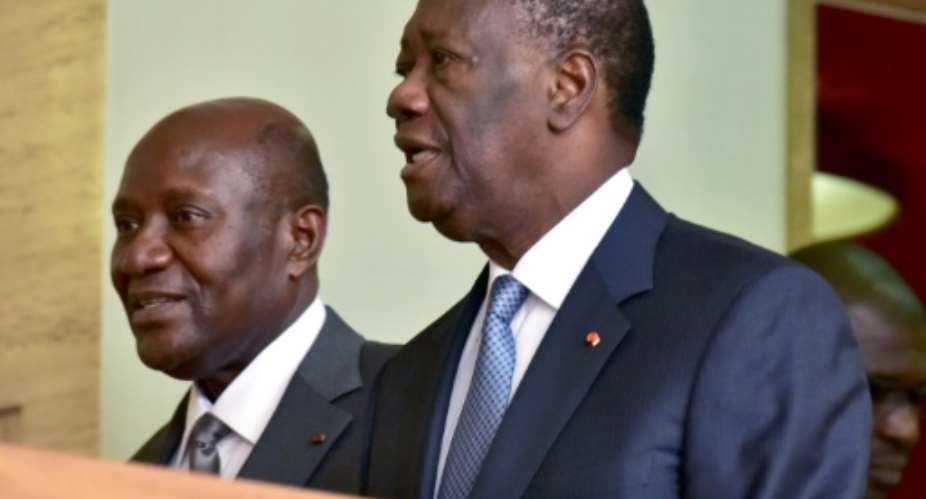Abidjan (AFP) - Ivory Coast initiated a post-election reshuffle on Monday and fired the heads of its armed forces and police after a brief army mutiny that stoked security fears in the world's top cocoa producer.
President Alassane Ouattara issued a statement saying he had accepted the resignations of Prime Minister Daniel Kablan Duncan and the cabinet, who would stay in office until their replacements were appointed.
The decision had been widely expected, coming on the heels of a legislative elections last month won by the governing coalition.
Separately, a presidential statement read on TV said Alassane Ouattara had signed three decrees ordering major changes in top security ranks.
The decrees "relieve General Soumaila Bakayoko as chief of staff of the armed forces of Ivory Coast, General Gervais Kouakou Kouassi, senior commander of the national gendarmerie, and the director-general of the police, Bredou M'Bia," the statement said.
Their replacements were named as General Sekou Toure, General Nicolas Kouadio Kouakou and Youssouf Kouyate, respectively. There were no further details.
Ouattara also issued decrees ending the functions of the secretary-general of the president's office and the minister in charge of presidential affairs, the post held by his right-hand man Amadou Gon Coulibaly and his younger brother Ibrahima Tene respectively.
 Former Ivorian Prime Minister Daniel Kablan Duncan delivers a speech following his resignation on January 9, 2017 at the presidential palace in Abidjan
Former Ivorian Prime Minister Daniel Kablan Duncan delivers a speech following his resignation on January 9, 2017 at the presidential palace in Abidjan
The mutiny saw soldiers seize the second city of Bouake, firing shots in the air and terrifying residents, while demanding bonuses, better pay and houses. The protests spread to other cities, including the economic capital Abidjan.
A deal to end the mutiny was struck on Sunday.
Defence Minister Alain Richard Donwahi, who was briefly held by the mutineers over the weekend, assured them on Monday that Ouattara had issued "firm instructions to bring solutions to your concerns".
State employees strike
Bouake, which is home to 1.5 million people, was the cradle of a rebellion which erupted in 2002 in a failed attempt to oust then president Laurent Gbagbo.
 Guillaume Soro (C) addresses lawmakers after being reelected speaker in Abidjan on January 9, 2017
Guillaume Soro (C) addresses lawmakers after being reelected speaker in Abidjan on January 9, 2017
The revolt sliced the former French colony into the rebel-held north and the government-controlled south and triggered years of unrest.
Twelve years later, a similar dispute over pay by rebels-turned-soldiers erupted in Bouake which spread to Abidjan and briefly brought the country to a standstill.
The government then agreed to a deal that provided amnesty for the mutineers and a financial settlement.
Speculation has mounted in Abidjan that former rebel leader Guillaume Soro, who served as premier for five years until 2012, engineered Friday's mutiny.
Just hours after the prime minister's resignation Soro was re-elected as parliamentary speaker, securing 95 percent of the votes case in the 230-seat assembly thanks to support from members of the ruling Houphouetist Rally for Democracy and Peace (RHDP) coalition.
Ouattara is scheduled to address the national assembly at 10:00 am (1000 GMT) on Tuesday, Soro announced.
Ivorian state employees meanwhile began a five-day strike on Monday to protest against pension cuts ranging from 30 to 50 percent and a plan to raise the retirement age from 55 to 60.
"The strike affects all sectors -- especially education, health and territorial administration," Theodore Gnagna Zadi, who is leading the strikers, told AFP.





 SSNIT must be managed without gov’t interference – Austin Gamey
SSNIT must be managed without gov’t interference – Austin Gamey
 Ejisu by-election could go either way between NPP and independent candidate — Gl...
Ejisu by-election could go either way between NPP and independent candidate — Gl...
 We never asked ministers, DCEs to bring NPP apparatchiks for returning officer r...
We never asked ministers, DCEs to bring NPP apparatchiks for returning officer r...
 No one denigrated the commission when you appointed NDC sympathizers during your...
No one denigrated the commission when you appointed NDC sympathizers during your...
 Used cloth dealers protests over delayed Kumasi Central Market project
Used cloth dealers protests over delayed Kumasi Central Market project
 A/R: Kwadaso onion market traders refuse to relocate to new site
A/R: Kwadaso onion market traders refuse to relocate to new site
 Dumsor: Corn mill operators at Kaneshie market face financial crisis
Dumsor: Corn mill operators at Kaneshie market face financial crisis
 Jamestown fishermen seek support over destruction of canoes by Tuesday's heavy d...
Jamestown fishermen seek support over destruction of canoes by Tuesday's heavy d...
 Election 2024: EC to commence voter registration exercise on May 7
Election 2024: EC to commence voter registration exercise on May 7
 Public schools rebranding: We’re switching to blue and white, we’re painting all...
Public schools rebranding: We’re switching to blue and white, we’re painting all...
